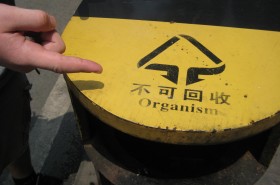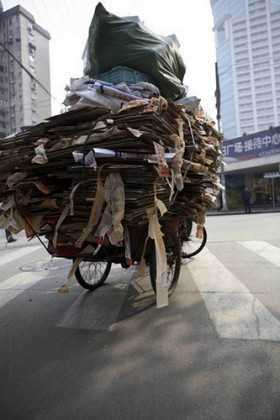On June 1st 2008 the Chinese government banned the free distribution of plastic bags at department stores and supermarkets. This law addresses issues of environmental protection by promoting a reduction in solid waste. The idea goes that by requiring that department stores and supermarkets to sell their plastic bags for 3 jiao (Chinese cents) to customers that don’t bring their own reusable bag (???), instead of offering them for free like they used to.
In environmental law this is referred to as the Polluter Pays Principal (PPP) – the environmental costs are passed on to the consumer/polluter. This is a sharp contrast to re-usable bag policies in the US, where some supermarkets offer a mere $0.10 discount to those who bring their own bags. In the US, consumers who take initiative to “think green” receive a trivial compensation, while the majority continues to receive free bags and neglects to amend their shopping habits.
This is the same flawed logic that was behind the USA Energy Policy Act of 2005, which provided meager tax credits to people that bought hybrid cars or installed energy efficient appliances, rather than taxing consumers who bought Hummers or otherwise fail to make any effort to minimize their resource and energy use.
I applaud the Chinese government for taking the upper hand in this legislation; PPP is the way to go in terms of environmental law (my fingers-crossed in hope that they will extend polluter pays principles on automobiles).
Considerations of Face

The timing of the bag ban is noteworthy, as it was enacted just a few months before Beijing hosted the 2008 Olympic Games. This was a period in which the spotlight was on China. World governments and activists brought attention to human’s rights issues such as problems in Darfur, improving factory conditions, freedom for political prisoners and many others. It could be argued that the government’s move to ban plastic bag was a strategic move to detract attention from more pressing controversial issues – both related and otherwise: the so called “garbage wars” controversy over the placement of waste incinerators in Beijing is already a deeply contested issue in the PRC.
“Some say the real push behind the new policy and its predecessors may be China’s pre-Olympics image and the high price of oil, from which plastic is derived, rather than concern over the environment,” China Environmental Law (CEL) blog noted at the time.
A snippet from a CEL interview,
“This whole thing is a big publicity stunt,” said Zhang Hua, a Beijing fishmonger. “Plastic is so convenient, whether you’re in China or abroad, that you won’t change people’s habits. We’ll still be using plastic for another 200 years.”
The Cash Factor
I first came to China in August 2008, landing in Beijing the day before the Olympics ended. My initial impressions of China were a bit scattered. I was shocked that a self-proclaimed “People’s Republic” would have such a high degree of social stratification: the street sweepers and bottle collectors were akin to the “untouchable” caste in India, yet I also became fascinated by the Chinese recycling system, which relied on such “untouchables” and their pedal-bikes/ san ling che to collect scrap metal, cardboard, beer bottles etc.

By reselling of construction and consumer byproducts these folks are able to make living for themselves and provide a “new life” for discarded materials.
An “ecological” exception to the Recyclable/Other Waste dichotomy one sees on rubbish bins. In terms of sorting few Chinese seem to take care to put waste in the right place. Bottle collectors will tip-over rubbish bins in search of redeemable bottles and the rest of trash winds up strewn over the sidewalk. (Chongqing) photo: Elias Witman
In a conversation with Adam Minter, who has studied the recycling trade in China for 8 years and authors Shanghai Scrap, he comments,
“When looking at the list of reasons why people recycle in China, it is first and foremost a business. I’d say environmental ethics probably ranks third.
Adam mentioned that that it is common for Chinese families to tell their children,
“If you don’t do your homework you’ll wind up as a bottle peddler!”
I suppose parents in America use similar logic to entice their kids into studying, by saying that if they do poorly in school they will become barrel-tossing “garbage men” making the rounds in suburban communities. Certainly the negative connotation with garbage/recycling jobs is seen on both sides of the globe.
The Environmental Impact
Regardless of which way one views the enactment of the law, it is more important to look at the actual impact.
According to the UK Guardian, China was able to save 1.6 million tons of oil and prevent 40 billion bags from entering landfills during the first year of the bag ban. Given the comments above and the propensity for stats in China to be somewhat … optimistic, I felt more work needed to be done.
So I followed up on these reports with a (very informal) interview of shoppers in Chengdu. Based on my observations, the bag ban seems to have caught on regardless of class, it is common to see both, shiny-shoed BMW drivers and canvas shoed bicyclers with their ???(reusable bags) in tote. Do these folks bring bags to save money, or are they concerned with environmental stewardship? Perhaps this was an expression of a post-structuralist Foucauldian concept of the self and self-ethics? Disappointingly my Chinese is not up to par to discuss Foucault …
The following is a transcript of a 9pm Monday interview at the TZLN Carrefour (Tongzilin, no relation, and far removed from the politics of EZLN Ejército Zapatista de Liberación Nacional).
What Chinese People Think
Translated from Sichuan-accented Mandarin
Older Lower Class Woman in Her 40’s
Me?Why did you bring your own bag tonight? Is it about environmental protection or saving money?
Woman: Both reasons.
Me: When did you begin bringing your own shopping bags?
Woman: It’s been a habit all along.
(For the next person, I amended my questions a bit to avoid terse uninformative responses)
Upper Class Married Woman in Her 30’s
Me?Why did you bring your own bag tonight?
Woman: “??”. Environmental protection.
Me: What does environmental protection mean to you?
Woman: Plastic bags are bad for the environment. By using my own bag multiple times I can use less natural resources.
Me: How long have you used your own re-usable bags?
Woman?Three years.
Older Woman in Her Late 30’s, Middle Class
Me? Why did you bring your own bag tonight?
Woman? It’s convenient
What do you think of environmental protection?
Woman? It is very good.
Apathetic Girls in Heels, 20-something
“Lamei” (hot and beautiful) looking gal, one of which was holding what looked like a brown reusable bag, but it turned out that it was packaging for a product she bought at the store.
Me: Did you bring that bag tonight?
Woman? Nope, I just bought this.
Me: Do you have re-usable bags at your home?
Woman? I don’t have any at home.
Me: You know that plastic bags cost 3 jiao, right?
No response, I think I pissed her off.
Analyzing the Data
So 3/4 people I spoke with provided positive responses to my, at times, awkward questioning. I was thrown off by the “it’s convenient ” response, Duh, of course it is! I also had a canvas bag slung on my shoulder with some items I’d picked up. You can wear a bag on your shoulder, load it up with goods, unload for checkout and be on your way. No need for a basket or shopping cart! Well perhaps Carrefour’s security team would frown upon people stowing goods in their hand bags as that is more along the lines of the “five-finger” discount.
Anyhow, I was pleased with the interview as a whole. Shoppers seemed to have good reasons behind why they did or didn’t bring their own bags. Surely I wasn’t expecting people to recite lines from Rachel Carson’s Silent Spring but I was able to gain a stronger sense of Chinese attitudes on the environment.
The purpose of this short piece was to fish out the “end pieces” — to frame an outline for the puzzle of Chinese attitudes on contemporary environmental issues. Environmental propaganda pops up around the city is seen reminding people to drive less, bring their own chopsticks, use less water etc. However, all of these recommendations are just small slices, larger themes of environmentally sustainable lifestyles are, for many, seen as “pie in the sky ideas”. What it comes down to is the fact that ecology is not major a part of the curriculum for public school students.

I finally approached the checkout line, making a point to select a longish line to for optimal “bag talk” with shoppers. I asked the girl in front of me why she didn’t bring her own bag tonight. She responded in near-perfect English, and explained that she was busy and forgot but did have re-usable bags at home.
The conversation went like this:
“Yes I have a bag like that at home, I use it often”
Do you think the law against providing free plastic bags is getting people to talk about environmental issues?
“Yes I do, but, about the effect, I’m not sure…”
I’m not sure either, that’s why I am working on this.
“So you are doing research?
(I hand her a glossy business card for ChengduLiving)
I’m interested in environmental politics in China.
“Environmental politics! I think in China, about this part not that much”
I want to see if people bringing their own bags, something simple like that, has the opportunity to educate or get people to think about deeper environmental issues.
“I think this depends on what kind of person, if this person is at University…or a person doing office work, more highly educated people”
Speaking of education, where you taught about??? (Ecology) at school, did you study this?
“??? I think that is a really good subject for not only China, but people all over the world. Now this is not a ????(executable requirement) in China now. But I think it should be”
Well, despite my wishes, I’m in no position to amend the Chinese education system.
In terms of broader environmental themes, China still has a looooooong way to go to reduce energy and resource consumption. I’ll remain optimistic and will continue to have conversations with ??? toting Chengdunese. Perhaps if I pester enough shoppers, they will ask about ecology lessons on weekends, rather than if I’m available to teach my native tongue.
Well, it looks like things are moving in the right direction. Thanks for the thoughtful post on this subject.
Stick with this project and see what real impact you can find in Chengdu … nice post.
Do you get the feeling that people in Chengdu really care about the environment at all? I see people discard trash on the street everyday – even sometimes see trash fly out of open windows when cars are stopped at traffic lights. What kind of people do that??
Fyi I’m the author this post.
@ Henry yes littering is a huge problem all across China and sadly not just limited to urban areas. I’ve spent lots of time traveling in rural Sichuan and Yunnan and sadly river valleys and gorges often windup as makeshift landfills.
It goes without question that the CCP needs to enforce new environmental legislation. But laws are one thing, education is what really can make a larger impact. Learning about ecosystems, over-consumption of natural resources and subsidies that allow for cheap plastic packaging is necessary to foster a stronger environmental ethic.
Environmentalism after all, is much more than recycling beer bottles and bringing a canvas bag to the supermarket.
yeah i have no idea why WordPress insists that I am the author … in the backend it clearly says 3li4s …. we’ll see if we can fix it soon — they need a Give a Hoot Don’t Pollute campaign in the kindergartens if they are to truly change the littering culture here …
I’m working on the author problem.
Today I went to vegetable market and brought plastic bags to re-use. It is quite simple, you don’t need a new bag every time you buy baozi or bananas.
Anyhow, washing and re-using plastic bags has been a habit of mine,.
So I bought some strawberries, at a whopping 7 kuai for 250g, and handed the laoban a bag. He insisted my bag was dirty and I should use his. I refused and told him to think about how many plastic bags are used everyday for such small purchases. He took my bag, put the strawberries inside, and laughed through his cigarette.
Banning bags in supermarkets is very small step, there are still billions of plastic bags used everyday to buy a 1.5kuai block of tofu or a few chili peppers.
Where will this waste go? Who is subsidizing the production of plastic bags, where is china getting the petroleum? What a plastic bag making factory look like? And think about what that factory is doing to the local watershed?
It’s easy to be cynical about environmental protection in China but i think we should applaud the plastic bag initiative. It seems to me that people are getting into the habit of bringing their own bags to supermarkets. Whether they do it out of concern for their environment, or to save a few jiao, well i guess it doesn’t really matter in the end.
Good article!
Eeep I just noticed various typos in my comments.
Thanks for staying positive Kuma.
Hope to see more dialogue between consumers and suppliers regarding natural resource use, “huan bao” isn’t a one way street!
It’s so hard to understand the integral role packaging has to play in marketing and selling your product.
Understood, but there are ecologically sustainable methods of packaging. Such alternatives are readily available. However, government subsidies and industrial trade policies has laid the foundation for ubiquitous use of petrochemicals in product packaging.
Given your user name, I’d suppose you are the expert on such matters.
Elias, thanks for the thought-provoking article. Have you seen any significant changes since this piece was posted?